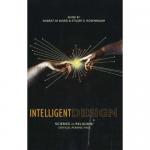Our public debates over "intelligent design" (ID) creationism tend to center on theological and political convictions, though ostensibly they are about natural science. After all, "intelligent design" is bad science, or "dead science" as Philip Kitcher puts it, so the scientific community treats it as a nuisance. A handful of scientists have exposed the weaknesses of ID in some technical detail, but everyone knows the real action takes place outside of science.
In this environment, Intelligent Design, a collection
edited by Robert Baird and
Stuart Rosenbaum, provides a very
useful introduction to the most
popular arguments made by public
defenders of evolution. Some of
the contributors address scientific
questions, but they never get overly
technical, and they always keep
the public discussion in mind. And
the bulk of the essays address
questions about "intelligent
design" and the science classroom,
including the burning question for
most Americans: whether evolution
is compatible with religion.
Since the evolution wars in the
United States are really political
contests between traditionalist and
modernist forms of religion,
Intelligent Design voices a liberal,
modernist theological point of
view, according to which science
and religion, when understood
correctly, occupy separate spheres
and are therefore compatible. Also,
importantly, the book focuses
almost entirely on the question of
ID in biology, including writers
such as Owen Gingerich who otherwise
defend a watered-down
form of ID in the context of physical cosmology.
Intelligent Design, a collection
edited by Robert Baird and
Stuart Rosenbaum, provides a very
useful introduction to the most
popular arguments made by public
defenders of evolution. Some of
the contributors address scientific
questions, but they never get overly
technical, and they always keep
the public discussion in mind. And
the bulk of the essays address
questions about "intelligent
design" and the science classroom,
including the burning question for
most Americans: whether evolution
is compatible with religion.
Since the evolution wars in the
United States are really political
contests between traditionalist and
modernist forms of religion,
Intelligent Design voices a liberal,
modernist theological point of
view, according to which science
and religion, when understood
correctly, occupy separate spheres
and are therefore compatible. Also,
importantly, the book focuses
almost entirely on the question of
ID in biology, including writers
such as Owen Gingerich who otherwise
defend a watered-down
form of ID in the context of physical cosmology.
That much does not distinguish this book from others in the market. But as a compact, readable introduction to a liberal religious critique of ID in biology, it is well-worth reading and should be useful to teachers and members of the community who want to find out more from critics of ID. Reading through the essays they will find reflections on the trial at Dover, short op-ed style responses to ID, and even some short selections from Darwin and Paley that help put the debate in context. They will definitely find ammunition against the irritating charge that accepting biological evolution means abandoning religious allegiances. If more people read and agreed with books like this, the jobs of everyone who teaches science in the United States would be much easier.
I would love to give this book to a high school teacher. Still, having said that, I find myself asking: how would someone respond if they were already inclined to favor ID? How persuasive would it be for someone not convinced that we can split the difference, let science and religion occupy their separate spheres, and end up with everyone happy all at once?
One reason I am prompted to raise the question is that I find such compatibilism too cheap, too politically convenient. (As someone who teaches science, I certainly find it convenient. But then, the stereotype of a waffling liberal is supposed to be someone who cannot be zealous even about his own interests.) For example, Intelligent Design includes Stephen Jay Gould's classic "Nonoverlapping magisteria." Rereading it, I am still unconvinced. I am even less moved by the editors' and Alfred I Tauber's Kantian approach to separate spheres. It all comes across as a bit too faith-based for my taste.
But that does not detract from the value of the book. Any disagreements I can summon up here are largely academic, and politically irrelevant. They certainly would have no effect whatsoever on what happens in a science classroom. If I have a concern, it is that I worry that creationists and ID sympathizers that I know are not impressed by liberal compatibilism. And they are intelligent people with substantial questions about divine action and what they see as the basic religious requirement of a top-down, mind-first, supernaturally governed universe. ID resonates with their religious intuitions, and liberal theology invariably comes across as overly sophisticated backpedaling. Now, I cannot help them. But I am not sure that handing them a copy of Baird and Rosenbaum's book would do much to quiet their fears about evolution either.
I do not want my worries to distract from the virtues of what is quite a decent book. Intelligent Design represents a very mainstream position adopted by public defenders of evolution in the United States. But especially outside the technical scientific context, an important virtue of an accessible defense of evolution should be its persuasive quality. I am not very confident about this. I would love to say I have some better idea myself. But I confess I do not, and I worry about relying too much on what has become a well-stereotyped set of arguments in favor of excluding ID from education. It would be intriguing to see if we have any new and imaginative ideas about how to persuade the public that only evolution deserves a place in the biology classroom. I do not see such ideas in Intelligent Design, but if this is a failure, it is a failure of all of us active in defending the integrity of science education.
